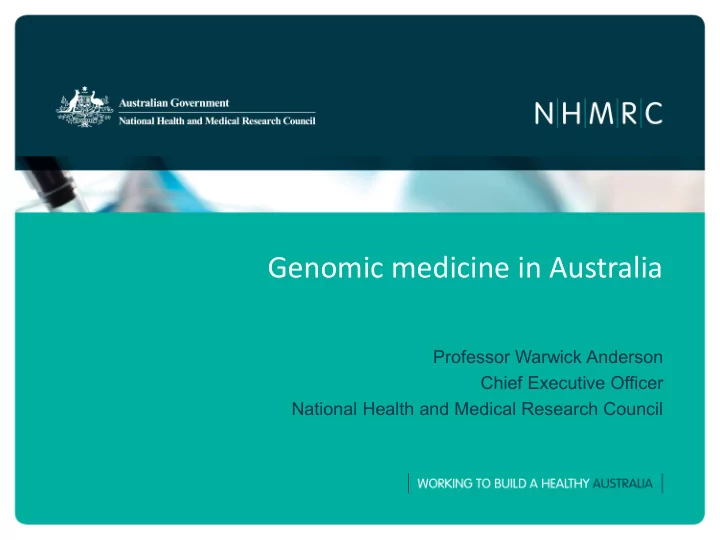

Genomic medicine in Australia Professor Warwick Anderson Chief Executive Officer National Health and Medical Research Council
This presentation… 1. NHMRC’s role – funding research and translation 2. Genetic/genomic testing in Australia 3. How is Australia positioned for the introduction of genomic medicine? 4. NHMRC work on an Australian framework
National Health and Medical Research Council Act 1. Raise the standard of individual and public health throughout Australia 2. Foster the development of consistent health standards between the States and Territories 3. Foster medical research and training and public health research and training throughout Australia 4. Foster consideration of ethical issues relating to health
National Health and Medical Research Council – Principal Committees – Australian Health Ethics – Human Genetics – Research – Health Care – Prevention and Community Health
NHMRC funding for genomics research A$ (millions) 180 NHMRC has invested 160 over A$1.2 billion 140 during the last ten 120 years in genetics / 100 genomics research. 80 Most biomedical 60 research now involves 40 a genomics 20 component. 0 Topics funded vary from genomic profiling of high risk acute lymphoblastic leukaemia to the development of personalised medicine decision support tools.
International Collaboration in Genomics (examples of NHMRC participation) • International Cancer Genome Consortium (ICGC) • Global Alliance to Enable Responsible Sharing of Genomic and Clinical Data • International Rare Diseases Research Consortium
The world – another perspective
2. Genetic/genomic testing in Australia • Responsibilities for health care in Australia are complex – spilt between different levels of government, and between government and the private sector. • Vast majority of clinical genetic services are provided by States and Territories (in public hospitals) • Funding reimbursement is available for genetic tests listed on the Medical Benefits Schedule (MBS). While the number of tests on the MBS is small (~20), they represent 25% of all genetic tests conducted. • Therapeutic Goods Administration (TGA) regulates genetic tests. • Australian Register of Therapeutic Goods (ARTG) listing requires that Australian standards of quality, safety and efficacy are met.
3. How is Australia positioned for the introduction of genomic medicine?
3. How is Australia positioned for the introduction of genomic medicine? • In a word – “mixed” • Data analysis and storage • Personal controlled electronic health records - barriers to up-scaling IT infrastructure are significant , especially many public hospitals - low uptake of electronic medical records (PCEHRs) • Workforce - professional bodies planning for the shift from ‘wet’ to ‘dry’ science - medical pathologists planning for new role – ‘clinical bioinformatician’ • Next generation sequencing is frequently outsourced to national providers (e.g. Australian Genome Research Facility) or large overseas facilities (e.g. BGI) • Decreasing cost and size of benchtop machines has led to an increased availability to most researchers in universities and institutes (distributed model)
Continued… • Evidential standards for clinical practice?; need clear separation between ‘research’ and ‘clinical’ genomic assays • Education – health professionals, patients and broad community • Direct-to-Consumer DNA testing – challenge for GPs • Co-dependent technologies – challenge is coordinating drug and treatment • Ethical, legal and social issues - key issues include return of results (incidental findings, implications for family members), access in rural and remote regions, risk-rated life insurance, intellectual property
3. National framework and principles for the translation of ‘omics-based’ discoveries into clinical care • NHMRC’s Strategic Plan 2013-2015 - “ Preparing Australia for the ‘omics’ revolution in health care ”. • Key challenge - consensus yet to develop on the evidential standards required to facilitate the translation of omics-based discoveries into clinical research and clinical practice, e.g. - verification of test relies on access to the data, the computer code and the computational steps - gene expression studies are not necessarily valid across different populations COUPLED WITH … pressure from industry and “enthusiastic” clinical researchers’ to fast-track genomic tests into clinical practice
NHMRC Framework and Principles for the Translation of Omics Discoveries into Clinical Research and Practice • Framework includes governing principles and identifies the following five domains (and principles) that apply to each 1) Laboratory research – includes analytical and clinical validation 2) Clinical research – importance of RCTs (albeit with adaptive designs) 3) Clinical practice – need for rapidly evolving clinical guidelines 4) Data repositories – access should be ‘open’, but not ‘unfettered’ 5) Ethical, legal and social issues – informed consent and return of incidental findings are key issues • Target consultation – workshop in March 2014 to test the principles against identified clinical disciplines, e.g. cardiology, gastroenterology, immunology
Other NHMRC genetic/genomic issues • Return of genomic results ‘Issues paper’ (including pertinent and incidental findings) – targeted consultation until end Jan 2014 • Genetic testing offered directly to the consumer – not legal for health related purposes, however most testing is offered by overseas laboratories. NHMRC has produced written advice for GPs and consumers; also developing a ‘position’ statement • Genetic discrimination - e.g. in Australia, applicants for risk- rated life insurance are required to disclose the results of genetic/genomic testing when applying for insurance – genetic predisposition offers the potential for discrimination.
Examples of Relevant NHMRC Publications (http://www.nhmrc.gov.au/guidelines-publications) • Medical Genetic Testing: Information for health professionals (2010) • Medical Genetic Testing: Health information for you and your family (2012) • Clinical Utility of Personalised medicine (2011) • Discussing Direct-to-Consumer Genetic DNA Testing with Patients: A Short Guide for Health Professionals (2013) • Biobanks information paper (2010)
Recommend
More recommend